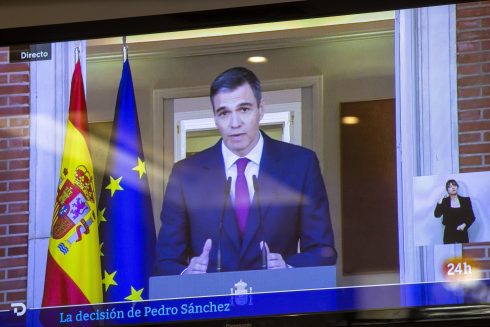SPANISH Prime Minister Pedro Sanchez has taken to the media interview circuit to explain his actions over the last week, after dramatically announcing that he would be taking five days to consider whether or not to quit, only to announce on Monday that he was, in the end, staying on in his role.
The Socialist Party (PSOE) leader gave a long and wide-ranging interview on Tuesday morning to the Cadena SER radio network, where he was grilled by Angels Barcelo, the presenter of the Hoy por Hoy morning show.
“I have faced an unprecedented personal situation,” he told his interviewer. “I have had a hard time, I have slept very little, I have eaten less, but I have found the strength to face this reactionary wave and defend democracy.”
Sanchez made his shock announcement last week via an open letter that he published on social network X (formerly Twitter), after a judge agreed to open an inquiry into his wife, Begona Gomez, on allegations of influence peddling. The lawsuit was filed by an obscure trade union, Manos Limpias, with links to the far right, and was based on newspaper headlines – at least one of which has already been proven to be false.

Sanchez then cleared his schedule for five days, during which he was nowhere to be seen, as he took the time to consider whether or not to quit.
“I was in a very bad way, I came to consider whether I should continue or not,” he added.
But after announcing at a press conference on Monday – at which he did not accept questions – that he would be staying on, on Tuesday he said that he would not only be seeing out the current political term, but that would also seek reelection at the next general election.
According to the prime minister, who is governing in coalition with leftist alliance Sumar and the support of smaller parties, he will be embarking on a ‘democratic regeneration plan’ for Spain.
For now, however, he has not released details of that plan, but has stated that one of his priorities is ‘the sludge machine’.
This expression – la máquina del fango – was coined by Italian historian and philosopher Umberto Eco, and is commonly used to refer to elements of the press as well as other channels, such as social media, that are employed to attack political opponents.
One of these lines of attack, he explained during his interview with Cadena SER today, is to revise the way that public funds are diverted to what he called ‘pseudo media outlets’, i.e. online digital publications that are often used to publish and spread fake news stories.
“We will have to uncover the workings, the money that is behind all of this,” he said. “Citizens have the right to have truthful information.”
The prime minister also denounced the attitudes of political leaders from the main opposition Partido Popular (PP), a conservative party, when it is not in power.
“Since [former PP Prime Minister Jose Maria] Aznar came to power, they will not accept the results at the ballot boxes,” he said, citing instances when the party has tried to delegitimise Socialist-led administrations.
He also referred to the hugely polarised political scene in Spain and the effect that this has had for politicians and how they are treated by the public.
“I have seen how people’s houses have been attacked, or piñatas that are made to look like the prime minister beaten with sticks,” he said. “These situations have become everyday occurrences, and there are people who may think, this goes with the territory, that it is part of the game. But this is not the case. […] Freedom of information is not freedom to slander.”
Despite having left his party and his supporters on tenterhooks for five days, with many convinced that he was about to quit, Sanchez made clear on Tuesday morning that he would be staying on for now.
“I am enthusiastic about these three years, and what Spaniards want thanks to their votes,” he said. “If Spaniards want me to continue as leader of the PSOE, as long as I continue to be enthusiastic, I will.”








